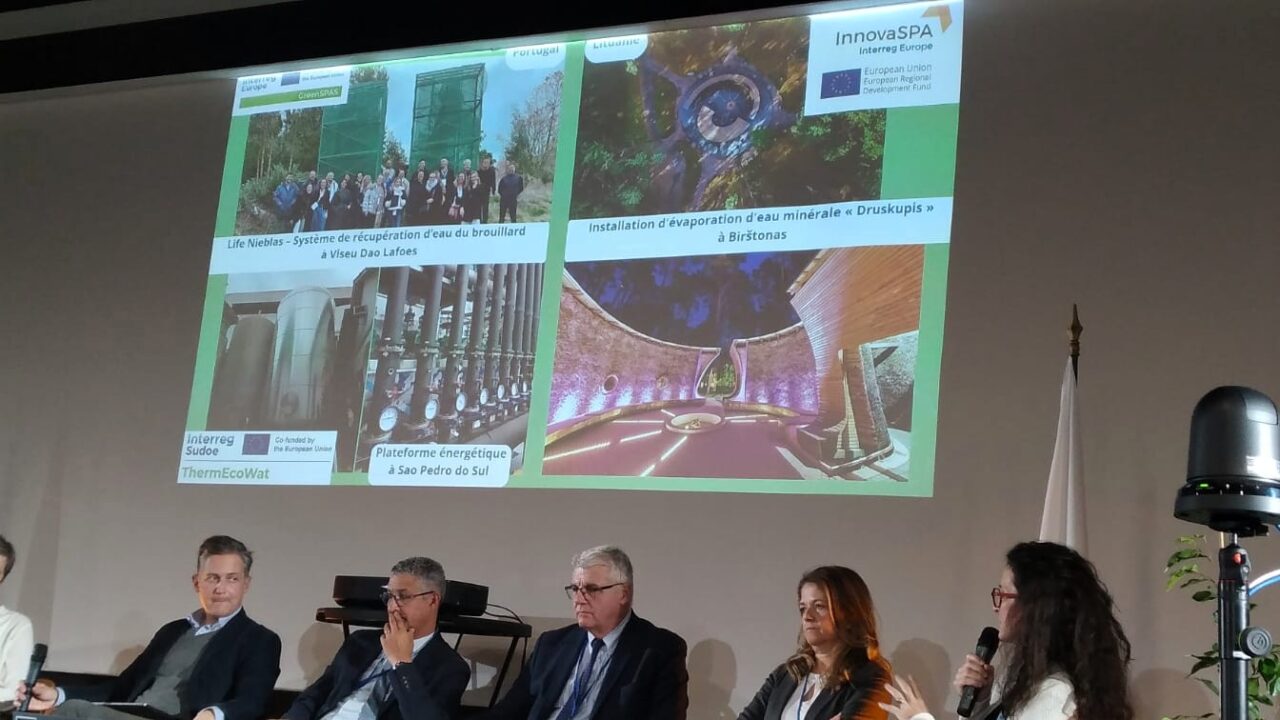On the occasion of the National Thermalism and Well-being Meetings in La Bourboule and Mont-dore (FR) on November 5–6, 2025, plenary session no. 4 highlighted ThermEcoWat, the European project led by Thermauvergne as lead partner, with a consortium of seven French, Spanish, and Portuguese partners.
Dedicated to the sustainable management of thermal and energy resources, ThermEcoWat aims to develop concrete solutions to support thermal spas in their ecological transition, improve the energy efficiency of establishments, and protect the quality of their waters.
The session also presented GreenSPAS, an Interreg Europe project led by La Route des Villes d’Eaux du Massif Central. GreenSPAS supports thermal spas across Europe in implementing public policies for climate change adaptation to strengthen their resilience.
Focus on adaptation and cooperation
The session brought together elected officials, scientists, experts, and territorial actors to reflect on the vulnerabilities and opportunities of thermal territories in the face of climate change impacts. Discussions emphasized water management, the preservation of natural environments, and the diversification of activities to enhance the resilience of spas.
A roundtable of experts committed at local, national, and European levels
All participants stressed the importance of cooperation and sharing best practices to strengthen the resilience of thermal territories against climate challenges.
- Stéphanie Giraud – Commissariat du Massif Central / ANCT: presented the strategic climate adaptation plan for the Massif Central. She emphasized that this plan, developed by the Massif Committee with the support of experts and local actors, fosters cooperation between institutions and territorial partners to identify vulnerabilities and structure concrete actions that enhance the resilience of Massif Central territories.
- Marion Roussel – Director of national and European cooperation, La Route des Villes d’Eaux du Massif Central & Thermauvergne: presented and highlighted the European projects ThermEcoWat and GreenSPAS, essential for climate adaptation and strengthening the resilience of thermal spas. She revisited ThermEcoWat’s objectives to enhance the resilience of thermal territories, while GreenSPAS improves public policies in thermal cities and regions across Europe. She stressed close cooperation with the Auvergne-Rhône-Alpes Region and European partners to share best practices and mobilize local actors to implement solutions adapted to each territory.
- Claudine Lamotte – Hydrogeologist and Project Manager at BRGM (French Geological Survey): presented the role of BRGM, the French partner of the ThermEcoWat project. She described the hydrothermal circuit of mineral waters and explained the potential impacts of climate change on these fragile resources. She emphasized the importance of cooperating with local and European actors to sustainably protect thermal waters and ensure management adapted to climate challenges.
- Rachid Ainouche – Water-Health-Environment Expert, William Terry Conseil / AFTh: presented the direct and chain consequences of climate change on thermal establishments, particularly on water resources and thermal activity. He noted that some areas, such as the Massif central, are among the most vulnerable, and outlined ongoing solutions to manage resources and enhance spa adaptation. He stressed the need to cooperate at all levels, local and European, around four axes: Monitor, Innovate, Collaborate, Adapt.
- Michel Brousse – Mayor of Chaudes-Aigues: presented his spa, a French pilot site for ThermEcoWat, as a privileged area to experiment with cooperation through co-creating, in his territory, a climate adaptation and action plan.
- Émilie Peyronnet – Project Director Thermalism and Full Health, Auvergne-Rhône-Alpes Region: presented the regional thermal plan, which aims to make spas destinations integrating health, physical activity, wellness, and nutrition. She also highlighted lessons from European exchanges with ThermEcoWat and GreenSPAS, citing, for example, the energy platform of São Pedro do Sul in Portugal and the Life Nieblas project for fog water recovery in the Viseu Dão Lafões region.
- Marie-Pierre Montoro-Sadoux – Vice President for Thermalism and Associations, Auvergne-Rhône-Alpes Region: presented the regional thermal plan, supporting spas in modernization and diversification. She stressed cooperation with various territorial and European actors to make spas places of full health, integrating climate, environmental, and wellness challenges.
A sector committed to the future
This meeting demonstrated how initiatives such as ThermEcoWat and GreenSPAS can support thermal spas in their climate transition, offering concrete solutions to adapt to climate change, innovate for the environment, and remain attractive and sustainable destinations.
It also illustrates the power of cooperation between territories, scientists, experts, and economic actors, essential to make local, national, and European thermal spas laboratories of environmental and wellness innovation. Finally, the roundtable showed that the Auvergne-Rhône-Alpes Region and the Massif Central are pioneering territories in the adaptation and resilience of thermal spas to climate change.


